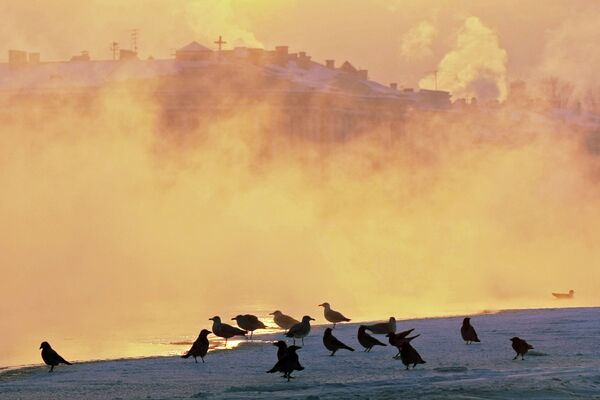Mass bird deaths world over, from the red-winged blackbirds in Arkansas, the turtle doves in Italy and the doves and pigeons in Canada, to the starlings in Romania and jackdaws in Sweden, are not a portent of the approaching apocalypse, ornithologists reassured a news conference at the RIA Novosti news agency in Moscow.
Actually, they said these instances of bird death should not, strictly speaking, be described as mass events but that it is nonetheless high time the international community addressed the problems faced by our global bird populations.
They explained that there is no single cause behind what we have seen in Europe and North America.
The 3,000 plus red-winged blackbirds that died in Arkansas might have been disoriented by the New Year firework displays, said Vladimir Galushin, a professor at the department of biogeography of Moscow State University's Geography Faculty. He explained how the birds, frightened by exploding firecrackers and fireworks, most likely collided with trees, electric lines, houses and cars.
Yet their death so far remains a mystery to ornithologists. The media speculated that they might have died of phosgene poisoning; phosgene is a combat chemical agent that was presumably buried in Arkansas. Even if this does not prove to be the case, Russian scientists are pushing for the causes of the disaster to be investigated thoroughly.
Italian turtle doves allegedly fell victim to their own greed, dying of massive indigestion brought on by overeating sunflower seeds.
Starlings in Romania possibly died from eating grapes leftover from wine-making, said Viktor Zubakin, president of the Russian Bird Conservation Union (RBCU).
There have been similar cases before. For example, a large number of waxwings died in Moscow after eating rowan-tree berries, which start fermenting when warm weather follows a cold spell.
Intoxication could have been the cause of quite a few cases of avian death this winter. Winters are always a difficult time for birds, but this winter has been inordinately severe across the world. The freezing rain that coated tree branches across Russia in late December prevented birds from getting at the insects hiding in the bark. This hit the common treecreeper, a small passerine bird, in Zvenigorod in the Moscow suburbs, said ornithologist Leonid Sokolov. Deep snow prevented Oxeyes from feeding.
Last summer was not a pleasant one for the animal kingdom either. Scientists have not yet calculated the number of birds that died because of record heat and smoke from wildfires. Birds started dying when abnormal temperatures eased up as avian diseases and smoke poisoning were compounded by stress provoked by the changing weather patterns.
Zoologists have often said that climate change could be one of the causes of this increased mortality among birds and other animals. Fish and crabs are known to die en masse because of sudden increases in water temperature. Deprived of food, coastal birds take off in search of more ambient climes, leaving their young to certain death.
Other causes include magnetic fluctuations, which have a severe impact on all birds whose seasonal migration patterns follow the earth's magnetic lines. The red-winged blackbirds of Arkansas could have died as a result of "magnetic storms or the trials of some kind of technical device," said Vladimir Galushin.
On the other hand, a global change could be underway that will affect all life on Earth the scientist added.
Kazimir Bolshakov heads the ornithological station located in the Curonian Spit in the Kaliningrad Region on the Baltic coast. He believes that humans are responsible for much of what currently afflicts our bird populations.
Birds get disoriented in large, artificially lit areas around cities, especially in wet weather when the vision is blurred. They fly into buildings, industrial pipes and telecom towers. Tens of millions of birds die like this every year. Birds also die from hitting glass, which they can't see, and electric transmission lines in wet weather, and they also face the threat of being hit by cars on highways.
Most bird deaths happen during the migration period and when young birds leave their nests, said Rustam Sagitov, the director of Baltic Fund for Nature. The better the highways and the speedier the cars, the more birds die. "The pace with which the birds are evolving cannot keep up with human development" and technical progress, Sagitov opined.
This is probably why we see birds flocking to large cities for winter. Wild ducks and three kinds of seagull now winter in Moscow, taking advantage of accessible water in lakes or ponds. Blackbirds do the same, and the city authorities now have a program in place to restore the population of peregrine falcons, which once inhabited belfries across Moscow.
"The fish-hawk and the goshawk, an unsociable bird, now seek refuge in St. Petersburg," Sagitov said.
Scientists don't like talking about stable trends in birds' lives. Even if they monitored birds across the country, the results of such studies would take decades to analyze. Meanwhile, birds will continue to live alongside humans and it is our duty to make things easier for them.
The views expressed in this article are the author's and do not necessarily represent those of RIA Novosti.

